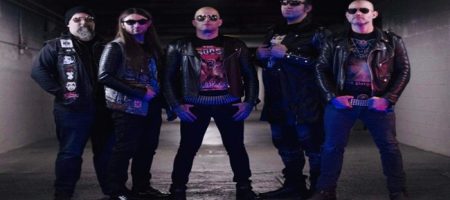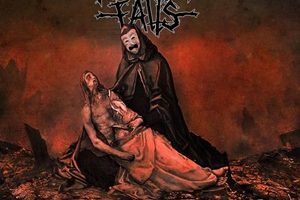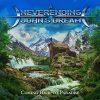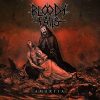Gracepoint – Life Waits for No Man
Monday, 25th April 2016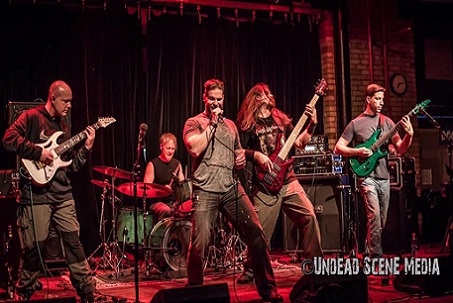
First rule of being in a band: blame the drummer when something goes wrong. Or, replace he/she with a machine. As anyone who has been in, or been around a band, (good) drummers are in short supply. They’re hot commodities, so much so, that bands will often hang onto a less-than-stellar timekeeper in order to stay afloat. For Minneapolis progressive metal outfit Gracepoint, the drummer quandary has been one that lasted nearly 15 years, starting with the departure of Lance Reed after the release of their 2000 Science of Discontent debut. The band would eventually cycle through 14 (!) drummers, before Reed returned to the fold to handle drums on the band’s new Echoes album. But it doesn’t end there…
Shortly thereafter wrapping the recording sessions for Echoes, Gracepoint landed a new drummer, Justin Koch, and subsequently re-recorded the drums with Reed’s blessing. Lest we not forget a serious illness that struck the family one of Gracepoint’s members and pinning down in-demand producer Neil Kernon (Nevermore, Nile), and the apropos quote courtesy of guitarist Stefan Radzilowski emerges: “Life waits no for man.” Indeed.
Here to wax on the band’s extended layoff, the complex, but thoroughly heavy tour-de-force that is Echoes, and much more is Mr. Radzilowski. Read on…
Dead Rhetoric: The metal scene is quite different in 2016 in comparison to 2000. Where do you think Gracepoint fits in?
Stefan Radzilowski: The funny thing is that we didn’t really fit in then! At that time, everything seemed to be rap metal or what we used to call “jump metal,’ heavy alternative stuff, Clear Channel corporate metal, industrial stuff, and the rest of the metal scene was moving to all death/brutal vocals all the time. We never seemed to fit neatly into any of those sub-genres and because guitar solos were still out of fashion from the anti-technique days of the ‘90s we were seen as old-school.
Now that some of the rigid stylistic barriers seem to have broken down, all kinds of styles are more freely mixed. Guitar solos are cool again and technical metal has gone through the roof in some ways. Matt [Tennessen] is a straight, clear metal singer with a lot of power and dirt, and because of this his kind of voice is old-school in some ways and yet new again because more bands are moving back to this approach.We really strive to write songs that have some strong melodies and memorable structures while remaining on the heavier side of things and I actually think that people might find our approach refreshing. At least we hope so!
Dead Rhetoric: I love the “sophisticated metal” tag. Who came up with it, and, why is it fitting for Gracepoint?
Radzilowski: I am not really sure where it came from but I believe it was Sam [van Moer], our bass player, who came up with that formulation. We never quite know how to categorize ourselves. Progressive works for some people and others get mad if we use that tag. We do aspire to some level of musical complexity but not really for its own sake. We do not try to write in funny time signatures on purpose. We just follow where the melody and rhythm of an idea take us and then figure out what we are doing after the fact. Once the drummer gets into the riff and says, “What the hell is going on here?” we will figure it out.
“Sophisticated” is not meant to be pompous by any means and there are many bands out there that are way more technical that we are but rather that we would like to think of ourselves as a cool kind of synthesis. We might describe it as a mix of classic metal and thrash, done tastefully, with hooks, strong melodies, and a focus on songwriting combined with a more modern, tuned-down, heavy style. Simply add several healthy dashes of 5/8, 7/8, and 15/16 and you have the Gracepoint recipe.
Dead Rhetoric: Neil Kernon did a fantastic job on Echoes. How did he enter the picture?
Radzilowski: We totally agree! Neil did outstanding work and is really one of the greatest people that we could have ever hoped to work with. He is brilliant, engaging, creative, professional, loyal, generous, and he has been a great friend to us. And he was not just patient with our situation, but perhaps “long-suffering” would be a more apt description!
Neil actually contacted us after Science of Discontent came out some years back and asked if we wanted to work on something together. We were all on the idea but then our long days in the desert began and it wasn’t until Lance kindly stepped back into the picture that we were able to get the ball moving again. We had been writing the whole time but were unable to take the next step.
Dead Rhetoric: What did you learn from him while recording the album?
Radzilowski: Where to start? We learned what we were doing wrong in the past and what we should be trying to do in the future in terms of technical engineering issues and organization. We learned some important things about recording that really should be kept in mind even when writing and arranging songs in terms of tuning, balancing harmonized melodies, maybe even sharing a little space for the vocals just to be nice to Matt. We are very excited to get a new album going and to really get the next one sounding even better…and finished a little more quickly.
Dead Rhetoric: A lot of the songs on Echoes are technical, but not overly technical. They’re catchy, too. What’s usually the approach when putting songs together?
Radzilowski: I would agree with that assessment wholeheartedly. We like to write so that we are always on a bit of a tightrope when playing because it is challenging and, if you can pull it off, it is very fun and rewarding, but we are not trying to out-technical anyone. Gracepoint is really about trying to write memorable songs that are interesting rhythmically and which have some kind of texture or melodic richness.
It might sound selfish, but we really are not writing for anyone or any market but just what we think sounds cool. It is funny because sometimes we are compared to some band that has had less than 0% influence on anyone in Gracepoint so we must be crossing lines by accident. I am glad that you did not use “catchy” as a slam. Being catchy can be seen as a terrible thing is some people’s minds but it really just means that there is a strong melodic presence and it really says nothing about whether an idea is original and interesting or not.
Now it might be different if you are talking about songs which are “catchy “because they were written using a stylistic formula. Sometimes a listener can predict every change before it happens because so many bands that are trying to fit into a certain style of music are doing the same thing. There are different kinds of hooks, some are cool and some are boring. Sabbath was hooky if you think about it for a second.
Dead Rhetoric: I love Matt’s vocals. Given how adventurous your compositions are, is it difficult to place his vocals over top some of the riffs?
Radzilowski: Thank you very much! We love them too and your question is very insightful and it identifies a real challenge when sliding around time signatures and shifting between odd and even meters within a single phrase. There are really two basic approaches: one is to float the vocals above the music by holding a lot of long notes which allow the music to move underneath and the second is to follow the rhythm very closely.
You can hear the soaring, long note approach used by tons of progressive bands but if that is all you do it can get sleepy. Attacking the rhythm with the vocals can be very cool but it can also lead to ridiculous syllable spitting that sounds too forced. The real secret is finding a careful balance between the two basic approaches but it is also important that the music underneath have a smooth and groovy approach to the shifting meters in order to give the vocals a pocket to fit into.
One great advantage of writing vocals over mixed meters is that, whatever the challenges may be, it really frees the vocal lines to take some interesting shapes and to use different kinds of words. If you think about your own speech it is never in even meter schemes but rather it is irregular and finds its own kind of flow and rhythmic logic.
Dead Rhetoric: As of now, how much of a priority is the band to you guys? Is it a “fun” thing, or, something you’d like to make more serious?
Radzilowski: Gracepoint has always been very serious for us, but we have just had a lot of challenges and obstacles along the way. In terms of it being serious as a way of making a living and being able to devote 100% of energies to music it is much more difficult. The music business is ugly and doesn’t pay well so hitting the road in a van and losing money for countless years is a young man’s game. We are very realistic with Gracepoint. We will consider opportunities as they come but we really determined to keep creating music and now we are in a good position to keep doing what we love without the long exiles between albums. And that we take seriously!
Dead Rhetoric: Finally, what’s on your agenda for the rest of 2016?
Radzilowski: We are already working on our next album because we have so many ideas from the past years that are finally getting the attention they deserve and we are coming up with new ideas all the time. We are very excited to finally have Echoes out of our heads and let people hear it and to see what they think of it. I hope that people will spend a little time with the music to learn some of the ins and outs to become more familiar with what we are trying to do. Go to the website and check out the lyrics because they are pretty cool and really add an important dimension to the compositions.
I also hope that people will resist the urge to force us into a certain box and that they will give us the benefit of the doubt that our overall approach has its own internal logic. Some people really want an album to be made up of different versions of the same song and we try not to do that. We really think that at the end of the Echoes you will be able to think back and feel that you have really been to some different places along the way in terms of moods, feels, and lyrical content.











